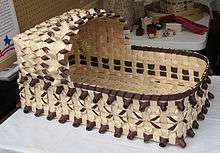Kelly Church
| Kelly Church | |
|---|---|
 Black ash baby basket with sweetgrass turtle charm, by Kelly Church | |
| Born |
Kelly Jean Church 1967 Michigan, United States |
| Nationality | Odawa-Ojibwe |
| Education |
Family, self-taught AFA Institute of American Indian Arts BFA University of Michigan |
| Known for | Basket weaving, painting, Mazinibaganjigan |
| Movement | Woodlands style |
| Awards | Michigan Traditional Arts Apprenticeship Award, Southwestern Association for Indian Arts Fellowship |
| Website | http://www.woodlandarts.com/ |
Kelly Jean Church (Grand Traverse Band of Ottawa and Chippewa Indians) is an award-winning black ash basket weaver, Woodlands style painter, birch bark biter, and educator.
Background
Kelly Church, a fifth-generation basket weaver, was born in 1967. She grew up in southwestern Michigan. Her mother is English and Irish, and her father is Odawa and Ojibwe. Kelly studied the Odawa language from her paternal grandmother and learned black ash basketry from her father, Bill Church, and cousin, John Pigeon. She in turn has taught her daughter, Cherish Parrish (Gun Lake Band Potawatomi).[1]
Church returned to school in later life, earning an Associate of Fine Arts degree from the Institute of American Indian Arts in 2006 and Bachelor of Fine Arts degree from the University of Michigan in 2008.[2]
Artwork
Basketry
Kelly harvests her own trees with her family in swampy areas of rural Michigan. Preparing the materials takes far longer than the weaving. She removes the bark from the felled log, and then splits apart the growth rings into finer and finer splints for basketry. The splints are dyed and soaked before weaving.[3]
Her baskets range from the utilitarian fishing creels, market baskets, and bark baskets to traditional, rectangular wedding baskets and whimsical strawberry baskets.[4] She also creates experimental baskets, with materials such as copper, photographs, and plastic window blinds – the latter a warning of what the future might look like without black ash trees.
Birch bark biting
Kelly is one of fewer than a dozen birch bark biters. This traditional Great Lakes art form involves biting designs with one's eyeteeth into folded sheet of young paper birch bark. The bit areas turn a dark brown that contrasts with the pale surface of the bark. Her designs are both abstract and representational, featuring turtles, dragonflies, and other designs.[4]
Painting
Inspired by the Woodlands style of painting created by Norval Morrisseau, Kelly paints characters from her tribes' oral histories, such as Nanabozho, or the wildlife native to Michigan, such as sandhill cranes. She typically works in acrylic on canvas and uses contrasting colors for maximum optical brilliance.
Honors and projects
Kelly has won many awards for her basketry, including the Michigan Traditional Arts Apprenticeship Award[1] and the 2008 Southwestern Association for Indian Arts Fellowship. In 2006 and 2008, she organized a symposium about tactics to save the black ash tree from the emerald ash borer,[1] with funding and support from the National Museum of the American Indian. More recently, Kelly was a recipient of National Museum of the American Indian Artist Leadership Program Award (2010), as well as the Michigan Traditional Arts Apprenticeship Award (2011).
Kelly was awarded "Best of Basketry" by the Southwestern Association for Indian Arts at the Santa Fe Indian Market 2016. She also received a Smithsonian Native Scholars Fellowship in 2016.
See also
Notes
- 1 2 3 Kelly Church (Grand Traverse Band of Chippewa and Ottawa), Hopkins, Michigan. Carriers of Culture: Living Native Basket Traditions. 31 Dec 2006 (retrieved 17 March 2009)
- ↑ Resume, The Art of Kelly Church and Cherish Parrish. 2009 (retrieved 16 December 2012)
- ↑ "Art Market at National Museum of the American Indian". Smithsonian Magazine. 5 Dec 2008 (retrieved 17 March 2009)
- 1 2 Programs and Activities: Kelly Church. Great Lakes Folk Festival. 2008 (retrieved 17 March 2009)
External links
- Chicago Tribune Article, April 2017
- Weaving and Protecting a History: A Conversation with Basketmaker Kelly Church, Mational Museum of the American Indian
- The Art of Kelly Church and Cherish Parrish
- Michigan Basket Maker Talks About Her Art. Morning Edition on WKAR, Story #954